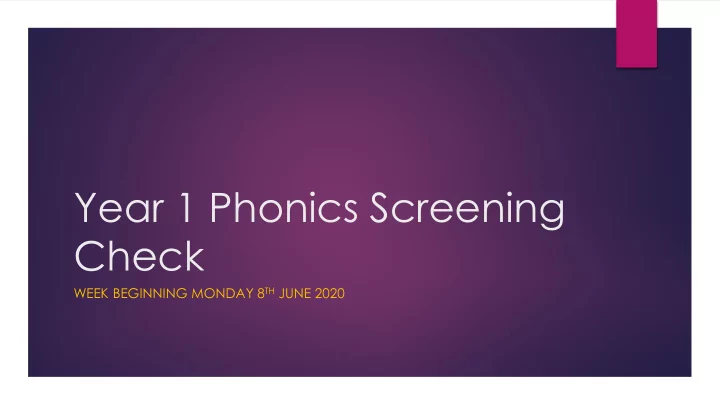

Year 1 Phonics Screening Check WEEK BEGINNING MONDAY 8 TH JUNE 2020
Phonics Vocabulary Grapheme - The written letter e.g. ‘a’ that represents a sound in a word. Phoneme - Is the sound the letter makes. Digraph - Two letters make one sound e.g. ch Trigraph - Three letters make one sound e.g. igh Tricky Words- Words that we cannot sound out as some letters make the wrong sound e.g. my
Year 1 During Reception each day began with a 30 minute Phonics session. We will continue to teach Phonics in Year 1 as part of our Writing sessions each day. The children will begin their session by learning a new grapheme and saying the phoneme. They will practise identifying the grapheme in various words and learning to read them. They will then work on writing words and sentences containing the focus grapheme as the writing part of their session.
The Phonics Check There are 40 words to read in the Phonics Check. The child is not allowed any help during the check. There are 2 sections of the Phonics Check. Section 1 contains easier words. There is no time limit. The check will be carried out by an adult in school familiar to the child, usually their class teacher. The checks are carried out in a quiet place. Children are allowed to mark underneath each word with sound buttons. The children have lots of opportunities to practise the checks throughout the year. We never refer to them as tests.
The Phonics Check After Christmas we will have lots of focus Phonics sessions during the afternoons to prepare the children for the types of words they might need to read.
How you can help at home Please look in the C.H.A.T. book each Friday as it will have your child’s Phonics homework in it and any spellings your child may need to practise. Reassure your child that they are doing a great job and try to make reading fun! Reading regularly with your child, just a small amount each night will really help them to apply what they have been learning in their Phonics sessions in school. Try to avoid hearing your child read at bedtime as they will be too tired to focus. They might prefer to be read to instead.
How you can help at home Listening to your child read can take many forms: First and foremost, focus developing an enjoyment and love of reading. Enjoy stories together – reading stories to your child is equally as important as listening to your child read. Read a little at a time but often, rather than rarely but for long periods of time! Talk about the story before, during and afterwards – discuss the plot, the characters, their feelings and actions, how it makes you feel, predict what will happen and encourage your child to have their own opinions. Look up definitions of words together – you could use a dictionary, the Internet or an app on a phone or tablet. All reading is valuable – it doesn’t have to be just stories. Reading can involve anything from fiction and non-fiction, poetry, newspapers, magazines, football programmes, TV guides. Visit the local library - it’s free!
Recommend
More recommend